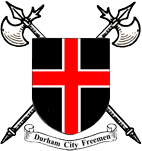
The authority plans to leave its present home at Aykley Heads and build replacement offices and associated parking on riverside land next to the Sands.
The freemen, whose trade guilds have helped shape the city’s trade and commerce across nearly 700 years, have a long-standing historic interest in the site ear-marked by the authority and, while they no longer own it, they retain a legal interest in its use.
A meeting of the freemen’s trustees, attended by the wardens of the eight trade guilds, agreed to lodge their unanimous opposition to the scheme.

The design of the new complex does not, say the freemen, satisfy key elements of established policies of the Durham City Local Plan which demand any new development does not detract from to the special character, appearance and setting of the conservation area and must be sensitive in terms of siting, scale, design and the materials to be used.
Creating a building running from three to five storeys, providing a workplace for 1,000 council employees, would be “relentless without any visual break.” In addition it would increase existing pressures of access to an area already promoted for social, business and community events where public buildings, a leisure complex and an hotel already operate.
The freemen’s objection also points to the need to promote a sustainable transport framework, insisting “it is naïve” to assume the majority of the council’s employees, as well as the public and visitors heading for the hotel, swimming baths, Passport Office and other attractions in the immediate area, would be using public transport.
“The current County Hall has 1,028 car parking spaces and the range of functions within the new offices will not be dissimilar. Yet just 81 additional spaces are being provided after the existing 256 reconfigured spaces are factored in. The inevitable consequence will be pressure on street parking in the Sands residential areas,” says the freemen’s submission.
It also suggests any argument suggesting no increase in vehicle movements in the area was “untenable” and current “problematic” levels of traffic in the Providence Row/Claypath area already existed. Pedestrian safety, given the residential character of the road down to the Sands, would be further compromised and air quality would also suffer.

If the application were to be approved, say the freemen, the first phase of any construction work “must be” the building of a multi-story car park, ensuring no loss of parking amenity for visitors to the city
The council’s planning application would have “a major impact for the city and future generations and cited the authority’s failure to offer any detailed study of alternative sites as a “significant omission.
The freemen also questioned the economic justification for the release of land at Aykley Heads as a strategic employment site. Independent professional opinion considered the projected rental values for the site were high and the worry was it could remain undeveloped – a concern mirrored by the dereliction of the old city swimming baths and abandonment of the DLI Museum.
- The freemen’s eight guilds currently have 250 members – a fifth of them women – and continue to support apprenticeships in the city, provide financial support to local organisations and promote the study and interpretation of the city’s long and colourful history.

